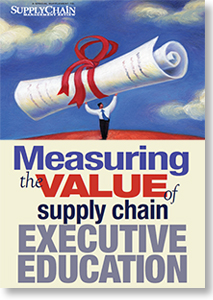Measuring the Value of Supply Chain Executive Education

Universities and colleges have enhanced their supply chain and logistics degree programs; organizations like APICS and the Institute for Supply Management have expanded their certification programs; and training firms offer myriad options to help executives stay current on supply chain trends. By Supply Chain Management Review
January 15, 2017
Executive-level supply chain positions have gained both prominence and importance for today’s global companies.
These executive education offerings provide executives with the opportunity to hone their skills, upgrade their technology acumen and better understand the inner workings of the modern-day supply chain.
In some cases, the executive education is served up in the traditional classroom setting, but increasingly we’re seeing more interest in short sessions (one or two days), online course delivery, or hybrid options that combine the two.
The programs can be non-degree-granting, certification-based, or lead to a full-blown degree in supply chain management or other subject. Customized programs that are tailored to the needs of individual companies are also growing in popularity, with most offerings targeted to supply chain professionals that are already employed in managerial and executive roles (or those who aspire to).
The question is, what value do current supply chain professionals gain from executive education and how can they apply these advantages for their companies and in their own careers?
In most cases, advanced education can translate into better opportunities for advancement, improved job prospects, more respect or status (as compared to those employees who may not participate in executive education) and even higher salaries.
For employers, this type of education supports employee retention while ensuring that executives have the latest, most relevant knowledge and skills they need in order to do their jobs.
No comments:
Post a Comment